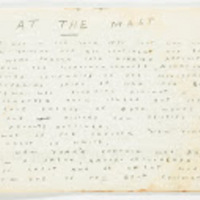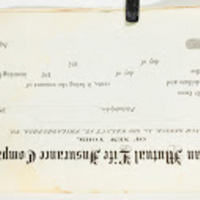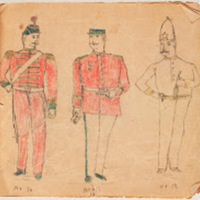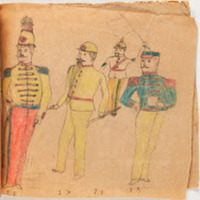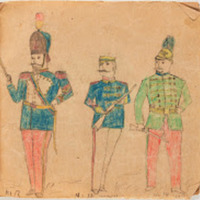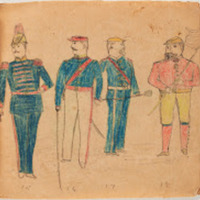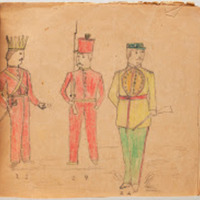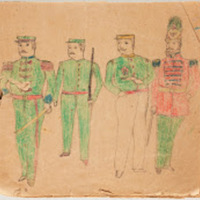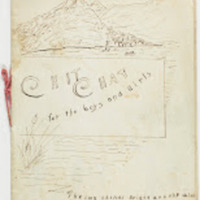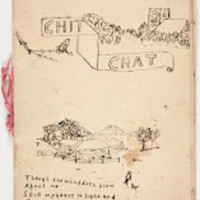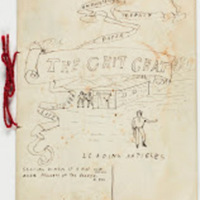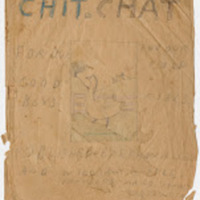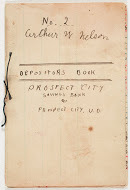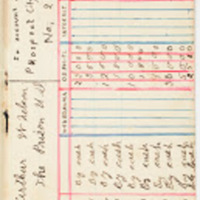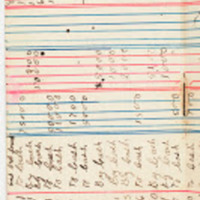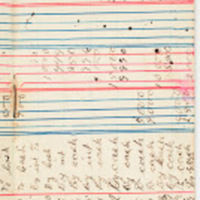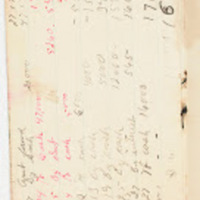Commercial
As Luther Vandross and Janet Jackson once sung , "The Best Things In Life Are Free." This concept is not fully recognized by the Nelson brothers. Although most of their work was beyond, best , most of their work had a price on it--not for free. The constant stumble over price tags on vegetations, books and essential life tools in the Nelson brothers' collection is enough evidence to plead the Nelson brothers' guilty of being monetarily well rounded and having a strong sense of commercialism.
At The Mast
Paradoxes of Danger and Security
The Nelson brother's little book At the Mast describes the war of 1898 between "Big Continent" and "Chipewa," two nations in the brothers' imaginary world. The picture depicting two ships is in reference to the building of ships. Undeniably, the nation of Chipewa had a healthy economy because its citizens were willing to contribute to the efforts of war in the form of money and the building of ships. The boys seem to know that when there is war, a plethora of manufacturing industries benefit
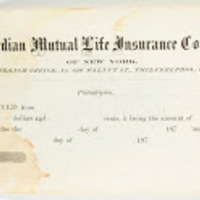
The Mutual Guardian Life Insurance Company, used as scrapp paper to write of the epic story of--At The Mast. This is the front cover of the page that contains the introductory paragraph (At The Mast, page 2).
The paradox of this particular book is that it tells of the precariousness of war between battleships, but it is drawn on an insurance policy. The safety of insurance and the destructiveness of battle fuse on a single piece of paper. The boy's seem to have capture the theme of "war before money" rather too well by alluding to piracy on this piece of document.
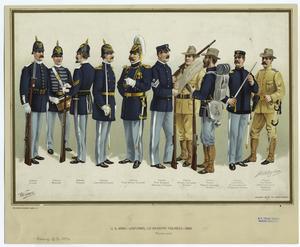
(Above) The U.S Army Uniforms, 1899.
(Below) The Nelson Brother's Military Fashion Design, 1893. (Military Uniform, pages
Military Uniforms
Welcome to the, Nelson Brothers', "Military Boutique"
The U.S Military Uniforms that you see at first hand created by Henry Alexander in the 1890's, does not differ much from Nelson Brothers' military fashion designs; the only key factor that distinguishes the two (besides the boy's elegantly sophomoric sketches) is the marked price the boys' put under each uniform.
This catalogue provides illustrations of different military attire as worn by different members of the militia. It also specifies a detailed description of the composition of each outfit. The boys', use their own male characters in their stories (Elmer's alter ego-Ethan Allen, kings, soldiers, members of different continents armies) as their uniform models. Is fun to speculate about what features of a particular outfit made it cost more then another outfit. Here are some examples of how the authors advertised their uniforms:
No. 12-Ethan Allen's dresses as he is usually seen in parades and training. It consist of red pants, yellow stripe down leg blue frock coat, with yellow and red braid on sleeves, yellow belt and fancy baldric red epaulet, white front gold buttons [Fishaco] blue sack red tassel and a yellow plum. Price: $55.
No. 13-Infantry dress, very dainty pants, white buck, red stripes down leg, blue frock coat, short skirt, five kilt cords on their breast shoulder knots of gilt cord cuffs colar, yellow colar trimmed with gilt cord cuffs trimmed with red brad cap, square top yellow-blue band. Price: $40.
No. 14-Sharp Shooters uniforms consists of short frock coat of green with heavy gilt cord across breast coat, with hooks and eyes and cord loops opposite buttons pants of red cloth with green stripes, B.C regulation helmet with fine gilt trimmins line officers belt. Price: $40.
The rich and intricate details contained in the advertisement pages of Military Uniforms, were convincing enough to make someone say--"I'll take one in every color!"--Without a doubt, the boy's were the Vogue editors of their era and their strong sense in military fashion was a gift they were willing to share at a price.
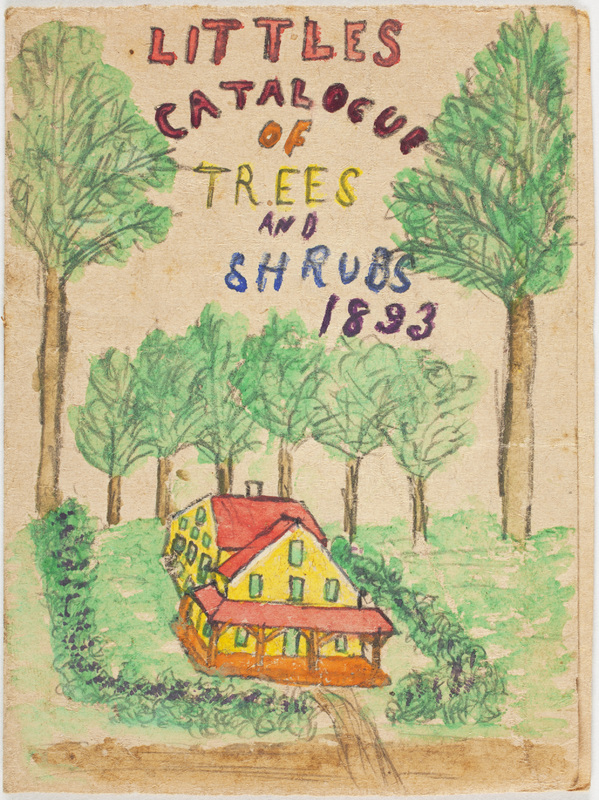
This is the original catalogue produced by William J. Little, Arthur's alter ego, in 1893 (Littles Catalogues of Trees and Shrubs, (page 1).
Littles Catalogue of Trees and Shrubs 1893
Local business expands
This is the most basic advertisement in the commercial realm; succint description of materials, prices, and delivery options--all on one page. In this particular catalogue you will find the type of trees/shrubs that are available and the prices for each one. Examples:"1 plant pine cliff hedge. 1" of Red northern pride. 1" city house shrub--Three kinds for only 50 cents." The fictional William J. Little knew that his trees and shrubs were one of a kind and, with that in mind, he took his business to the next level and went beyond the local costumer base and offered shipment through "Express." Methods of payment in this document are also great in that it makes the reader aware of the types of monetary systems that existed in their imainary "wourld" in 1893. This may have been a small catalogue compared to most, but it would be a great mistake not to acknowledge the --original!-- small business template in the Nelson Brother's collection.
Chit-Chat
Extra! Extra! Read all about it!
Chit Chat is one of the most exciting readings in the Nelson Brother's literature collection. The four exclusive issues of Chit Chat magazine are full of action thrills and complelling stories, along with other references to other works made by the Nelson brothers. The brilliant publishers, Ethan Allen and William J. Little, were targeting adolescence in "Holkton, Long Continent", often adressed in their Chit Chat publications as the girls and boys. The Nelson brothers' magazines show how well they understood the literary marketplace.
Like most magazines, each issue of Chit Chat was unique because the brothers released them monthly, often having content influenced by the seasons.
"Though the window blow about me, still my heart is light and free" (Chit Chat-January, 1893 issue)
The "January" edition, for example, contained stories and adventures that one may face in winter conditions; climbing mountains, spending the night with your spouse during the snow days, and imaginative trips to places one may want to go instead of being sourrounded by the snow. They also made sure to advertise some of their most brilliant creations that were essential to having fun in the snow. In fact, there is an article in this issue that provides instructions on how to build a means of traversing through the snow. The issue also instructs readers on fixing sleds--they even debated about the best way to traverse through the snow (sled vs ski boards), arguing which one provides the opportunity to have more fun.
This month is December. Alittle colder than November. "Clink! clink!" goes the skate.The team sters lord their sleds with logs and get home late. And the old soakers drink all they can hold, and then blow their fingers because they are cold (Chit Chat, February , 1893 issue).
The "February" publication shows an effort to provide entertainment to the boring lives of citizens in "Long Continent." The Nelson brothers' strategy for selling their magazines is displayed in both the December and February issues of Chit Chat. Stories like "How the Hunts Became Rich," "Skating, When it Is Not Fun" and "Lost Mountain" are all parts of a series. It was the Nelson's way of telling the reader that 'What happens next is just a season and 10 cents away--stay tuned!'
Chritmas is alsmost here. The happiest time of all the year and here comes our premium list. Your hearts to cheer.(Chit Chat - February, 1893 issue)
Another endearing factor in the "December" magazine is the premium package list. This package list sells the best of the best for children audiences at a fair price: "Indian masks", "white man masks", "any man masks"," toy trains", "toy canoes", "sleighs", "sleds", "sledges", and many more. Whats most interesting about this magazine is that it includes a content list--perhaps the the neatest magazine printing that the boys' produced in their Chit Chat issues.
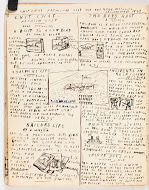
The list of articles included in this page is part of the December premium package the boys were advertising. The articles are as follow: "A Soldiers Life" by Franz Booth, "Sailors Life" by J. Miller, "The boys Raft" J Miller, "Insidents In Rock Island History" by Wiliam J. Little, "Different Stories" by Three Great Authors, "Thirty Days War" by William Little( At The Mast, page 6)
A Chit Chat fan favorite:
Readers will find a collection of magazines advertised to kids and men interested in the theme of war on page 16 of the January issue of Chit Chat. Most of these stories contain content that discuss particular struggles that one may face if they were a sailor, a soldier, or a child within war parameters. The prices for these magazines are relatively high compared to other Nelson brothers' products or items. This collection of magazines reflects the boy's patriotism and, to a certain extent, who they were as adventurers of their own "wourld".
Bank Depositors Book
The Nelson Brother's Prospect Bank
In this book, Prospect City Savings Bank, you will find a record of what may be interpreted as the Nelson brothers very own bank account. The amount of money saved in "The Prospect Bank" was accumulated from 1893-1897. Some of the "cash" deposits are as large as $22,000. It may just be that the Nelson brothers created this bank to work on basic mathematics skills that they could use in the real world.
Can you decipher the purpose of the fantastic, Prospect City Savings Bank?
